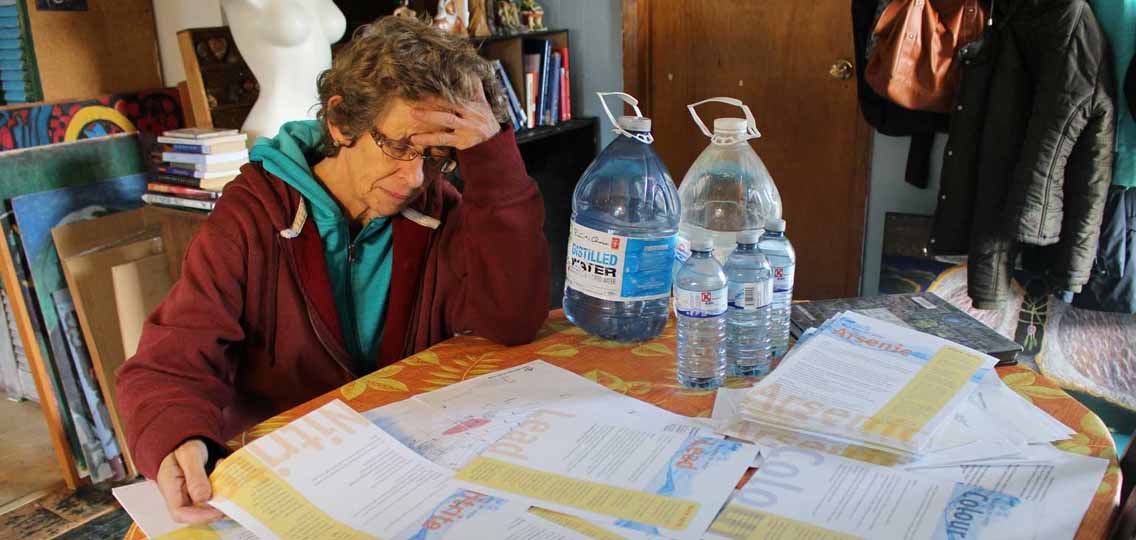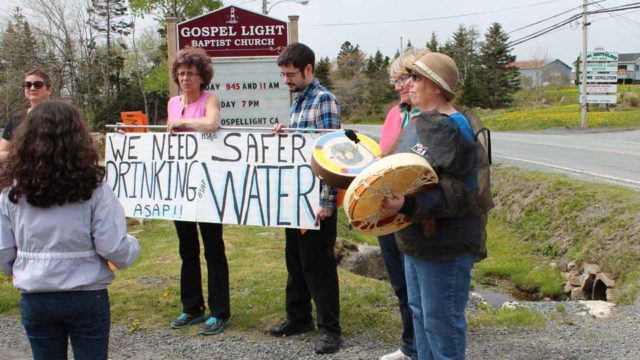Residents call on ombudsman to help improve drinking water services to their community
The community of Harrietsfield, Nova Scotia, is surrounded by an abundance of natural beauty. Located in the western region of the Halifax Regional Municipality, the rural community is home to generations of families who have lived in the area for hundreds of years. Counted among those life-long residents is Marlene Brown.
Halifax’s municipal water supply ends just before Harrietsfield, so like many other residents, Marlene relies on well water. Unfortunately, Marlene is afraid that drinking the water from her well could put her health at risk, so she drives to her local church to fill up water jugs and ensure she has enough water to meet her daily needs. Here’s why:
2003 – The operators of a Construction & Demolition (C & D) recycling facility across the road from Marlene’s home applies to Nova Scotia Environment (NSE) for an approval to dispose of C & D waste on the property. NSE refuses the approval because the risk of irreversible damage to the environment is unacceptable.
A few months later NSE permits the operators to dispose of stockpiled waste in a containment cell. The containment cell’s liner, cell wall and capping were to have been certified by a geotechnical engineer.
Regular monitoring of Harrietsfield’s well water begins. Residents are told the testing is required by NSE because contamination from the construction and demolition recycling facility across the road is impacting surface water and groundwater in the area.
2009 – After noticing fluctuations in the well water data provided to residents, Marlene writes to NSE to find out what is going on. She is shocked to learn that no one in the ministry has been reviewing and analyzing the data on Harrietsfield’s well water quality.
NSE also reveals that seven domestic wells located near the recycling facility are “very likely” or “likely” influenced by contamination from the site, and that a groundwater plume appears to be mobilizing uranium into groundwater and upward trends in other contaminants as well. It appears that the contamination is due to operations on the site as well as the containment cell.
2010 – Nova Scotia’s Minister of Environment issues an order requiring five past and present owners and operators to monitor contamination develop plans to manage the site.
2013 – Marlene and her neighbours learn that one of the named operators is going to court to fight the order.
Ecojustice lawyers get involved and represent Marlene and two of her neighbours before the Nova Scotia Supreme Court, arguing that the order must be upheld.
2015 – The Court upholds the order. The Court also orders the Minister of Environment to reconsider a clause in the order that deals with the containment cell. It remains unclear whether a geoengineer ever certified the containment cell and whether the cell’s leachate collection system was regularly monitored as required by government.
2016 – The cell remains on the site to this day and contains approximately 120,000 tonnes of waste that continues to pose a risk to some residents’ water supply. Marlene and her neighbours have had no further updates from NSE about plans to remediate the site.
Knowing all this, would you drink the well water if you were in Marlene’s boots?
The case for the right to a healthy environment
Marlene and her neighbours have been left in the dark about what is being done to protect their drinking water. This puts them in a situation of extreme stress and is forcing individuals with limited financial means to find alternative sources of water. Many community members have installed water treatment systems at their own expense, and in some instances even treated water has exceeded Canadian Drinking Water Quality Guidelines. No one should be forced to drink water that poses serious risks to their health or that has a foul odour, colour, or taste caused by activities beyond their control.
What is happening to Marlene and other property owners impacted by groundwater contamination is a clear example of why the basic human right to a healthy environment, including access to clean drinking water, should be recognized in Canadian law. In this particular instance, procedural environmental rights guaranteed through a provincial environmental bill of rights — things like access to information and the right to participate in government decision-making that impacts one’s health and environment — could have made a big difference.
At the very least, Marlene and her neighbours should have had the opportunity to voice their concerns about matters that impact the quality of their lives. And, as the government continues to make decisions about their water’s fate, Harrietsfield residents should be kept informed about the clean-up order and have the opportunity to engage in related decision-making.
Next steps for Harrietsfield residents
Unfortunately, Nova Scotia doesn’t have an environmental bill of rights, nor does Canada recognize the right to a healthy environment. As a result, Marlene and her neighbours lack important legal tools to enforce their rights and protect their drinking water. Because the problems continue despite years of effort, Marlene is asking the Nova Scotia Ombudsman to help.
Lawyers from Ecojustice and ECELAW have helped Marlene submit a complaint outlining the unfair treatment to which she and her neighbours have been subjected. She is asking the ombudsman to recommend improvements to Nova Scotia Environment’s administration of the Environment Act and the provision of drinking water services to Harrietsfield.
Despite years of unsuccessful attempts to resolve groundwater contamination in Harrietsfield, we’re still optimistic. In addition to the province and the companies responsible, we believe the federal government and the municipality — which licensed the facility during its 15 years of operation — have a role to play in finding a solution. We urge all three levels of government, and the companies responsible for the contamination, to come together and step up.
What’s happening to Marlene and other residents of Harrietsfield is not right, and should not be allowed to persist.
In the meantime, Marlene and her neighbours have no choice but to go on with their lives, filling up jugs of drinking water at the local church and doing what they can to advocate for our basic human right to a healthy environment and clean drinking water.


